Lucy van Oldenbarneveld, host-journalist-storyteller-force of nature
“I think it’s important to take chances wherever you are, whatever stage you’re at.”
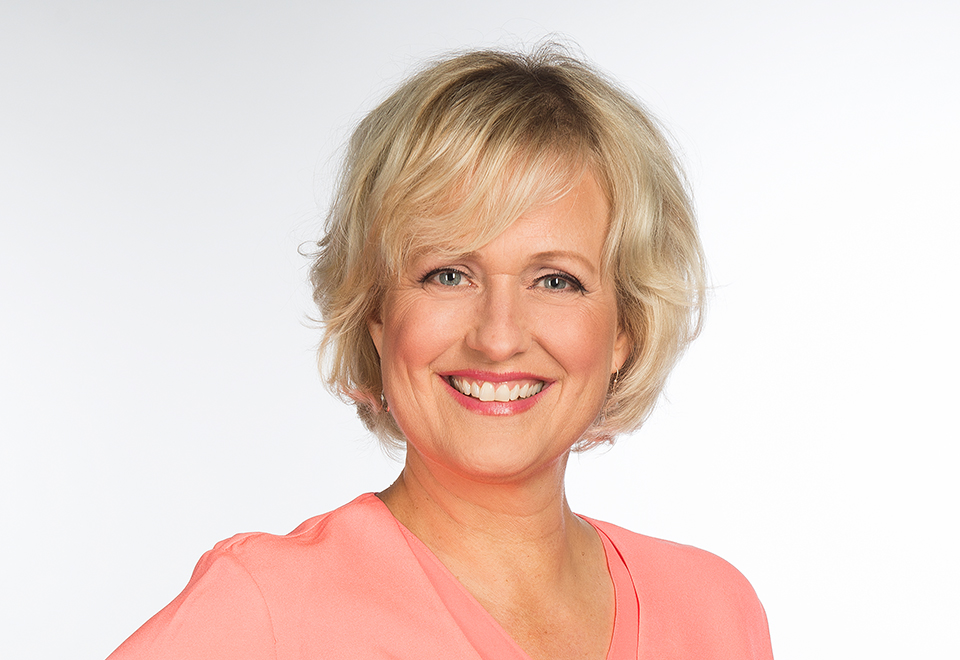
You get a sense, in listening to Lucy van Oldenbarneveld or reflecting on her remarkable journey so far, that there’s a powerful force at work—and at play. Life flows freely through her because she is open to chance, to opportunity, and because she trusts her instincts.
“Just jumping and hoping the parachute opens has always been my go-to ‘plan’ and it’s always worked out well enough for me—to know that life is for experiencing, not necessarily about calculated planning,” she says.
From maverick paper-recycler/notebook-maker, to movie star (give or take), to award-winning CBC television anchor, and many, many roles in between and beyond, Lucy has made every choice with guts and gusto. So where does that confidence come from?
“I was the first (of three children),” she says. “I was the only child for five years of my life… I think when you have your parents’ adoration at a young age, it sets you up (for success).”
Lucy’s parents, Mary and Rudy van Oldenbarneveld, were Dutch immigrants. (Lucy speaks Dutch, as well as “passable German.”) They settled in Hamilton, Ontario, where her father was a steel worker and her mother raised the children. Her sister, Tracy, was born when Lucy was five; three years later, their brother, Michael, arrived—right around the time their father left.
From that point on, Lucy says, “we were raised by a single mother, on the rough streets of Hamilton.” Rudy was only minimally involved, and money was tight. The family relied on social assistance and always looked for ways to save. “We would go and wait in line for half-priced bread at the Dominion store [now Metro] on Saturday nights.”
But none of that wore at Lucy’s enthusiasm. If anything, it strengthened her drive and determination. She always had something on the go, from more conventional gigs, like paper routes, or working at a fish and chips stand and a sandwich shop, to collecting scraps from a nearby paper company’s dumpster and assembling them into “little notebooks that I would sell to anybody I could find.”
Her favourite job—perhaps even to this day—came about when she was 15: she joined the blocks-long line of Hamilton teenagers aching to work the concession stand at the city’s new roller rink, and walked away with the job. “I couldn’t believe my luck,” she says. “It was the early 80s, and roller skating was the most exciting thing for teens at that time.” Coming from a family with little to spend, it was no small perk to be able to roller skate for free any time she wanted. She kept that job until she finished high school.
Now what?
Before deciding what to do after graduation, there was an eclectic rotation of possible vocations—not all of which, Lucy says, were grounded in reality. They included: professional tennis player, professional baseball player, journalist, secretary, lawyer. And “there was always something about writing and performing.” In middle school, she began writing plays and discovered that she was just as thrilled to watch other people perform her work as she was to deliver the words herself. She was also drawn to current events and politics. “I’d write letters to the editor when I was a teenager… I helped deliver fliers during elections. I thought the political process was so fascinating.”
At 17, she took a solo bus trip to San Francisco. (“My mother let me roam.”) She used some of her savings to buy her ticket, and planned the three-week trip around spending nights on the bus. “Wherever I landed in the morning at 6am, I’d spend the day there and walk all over,” she says. San Francisco was the goal destination because her grandmother “was always in love with the Golden Gate Bridge,” but living in Holland, she hadn’t been able to get there. So, Lucy wound her way up the coast until she finally reached the great city, where she explored Fisherman’s Wharf, toured Alcatraz, and paid homage to her grandmother by walking back and forth across the Golden Gate Bridge. “Then I just sat by the water until my bus left at 7pm… (That whole trip) was magical. I still think of it so fondly.”
When she returned home, it was nice—at first. But before long, the question of her lifetime popped up: Now what? “It was always wanderlust after that,” she says. “Always wondering, ‘Where am I going next?’”
Lucy was the first person in her family to attend university. She hadn’t planned on going, until her last year of high school, when her best friend decided to go. Lucy wound up enrolling in Political Studies at Kingston, Ontario’s Queen’s University, in spite of skepticism in her household about the merits of a university education. “We struggled with that idea: you didn’t come out of there with any tangible skills, so what’s the point?”
Once she got there, she saw the point. “It was fantastic, it was so transformative,” she says. “It opened your eyes to a whole world out there… It’s about thinking and how to learn and being curious and just evolving as a person—living away from home, all of that kind of stuff… And these people I met at Queen’s, from all over Canada, became some of my best friends… It was amazing to glom onto their life experiences.”
Not that she wasn’t still cultivating plenty of life experiences on her own. In the summer before her final year, she blew her savings on a six-week trip to Guatemala. It meant she had to live in a friend’s pantry for her fourth year at Queen’s. But she still says it was entirely worthwhile. “If you have the means and you (aren’t tied down), I think it’s important to take those chances wherever you are, whatever stage you’re at.”
After graduating with a BA in 1989, Lucy, again, wasn’t sure what was next. She spent a year bartending and waiting tables in Kingston before deciding she needed to get away. Friends had recommended Yukon, and she’d heard that the minimum wage in Whitehorse was good. So, in April 1990, equipped with sleeping bag, Therm-a-Rest, tent and a bag of sandwiches, she headed for the bus station (“the cheapest way to get there”). Her last stop was Bellingham, Washington, where she caught the weekly ferry to Whitehorse “with hours to spare—we got delayed by an avalanche in Rogers Pass.” She couldn’t afford a cabin, so she spent the three-night trip sleeping on the deck, under heat lamps. That might sound miserable to some; to Lucy, it was invigorating. “As we got further North, it was so cool to be sleeping outside on the ferry. The book I was reading at the time was Simone de Beauvoir’s Memoirs of a Dutiful Daughter—it was this big time in feminism, doing your own thing and just exploring the world. It was an incredible time for me to go through the Inside Passage of Alaska. It is breathtaking, it is so beautiful. These snowcapped mountains, you’re on the ocean, there are dolphins and orcas jumping around.”
At the end of that mystical ride, she got a lift from some of the passengers she’d befriended on the ferry, and arrived in Yukon. There was still snow on the ground, but she pitched her tent anyway. After a few months of camping and the occasional housesitting stint, as well as bartending, she found her own place and moved into the world of policy and speech writing. Her work included writing for Norma Kassi of the Yukon Legislative Assembly, who was trying to preserve the Porcupine caribou herd in the North; a two-year gig at the Council of Yukon First Nations; and serving as Executive Assistant to the Minister of Health.
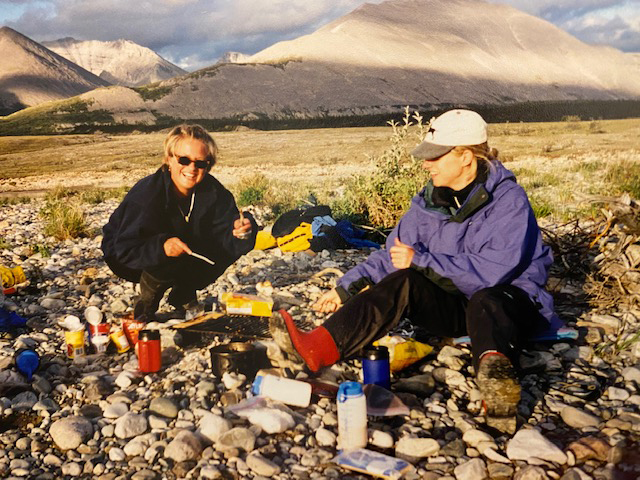
Lucy (left) with her friend Michelle Madden, during a break on their two-week canoe trip along Wind River in Yukon
Lucy also revisited her performance roots. She acted in local plays and joined the dinner theatre cast of Rendezvous Comedy Review. In 1996, she landed a small speaking role in the TV movie The Cold Heart of a Killer. “The whole town was atwitter,” she says. “The movie had big stars like Corbin Bernsen, Kate Jackson from Charlie’s Angels, Michael Damian from The Young and the Restless, and they were giving out parts… It was just so fun.” (She went on to play news anchors in the 2016 film Arrival, from director and Kickass Canadian Denis Villeneuve, and in 2019’s Long Shot, starring Charlize Theron and Seth Rogen.)
For the 1996-97 school year, Lucy took 10 months away from Yukon to teach English as a Second Language in Beijing—after the friend of a friend tossed the idea out at a wedding in Yellowknife, NWT. “He was going to China and told me that one of the English teachers had just dropped out,” she says. “He asked if I’d be interested, and I said, ‘Okay!’ Six weeks later, I was on a plane.”
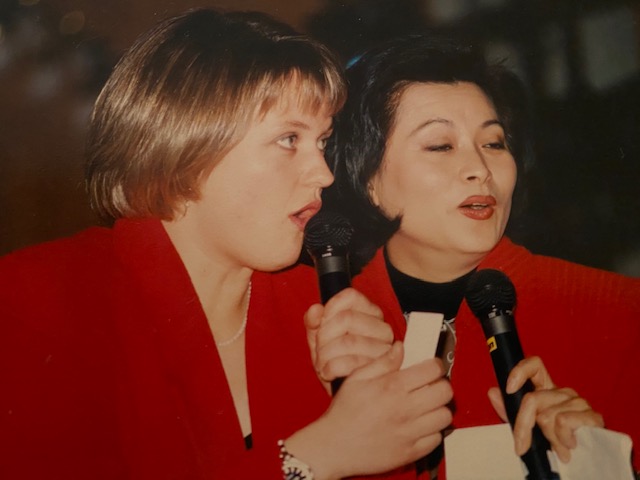
Lucy (left) co-hosting a New Year’s Eve event at Beijing International Hotel, 1996
When she finished her teaching assignment, she wasn’t ready to leave Beijing: “I loved it there.” But she’d committed to touring a one-woman music and comedy show, called Cloudberry, written by a friend in Whitehorse. So, she went back and rehearsed for a few weeks before taking the show to fringe festivals in Edmonton, Vancouver, Victoria, San Francisco and, finally, back to Whitehorse.
Doing the show “was fantastic.” Still, by the end of the run, she was ready to pursue some of her many other passions. “I really enjoy acting, but I wasn’t that great. I’m not trying to be falsely modest; it’s just cold, hard reality. I decided to find stuff that I’m actually better at.”
CBC and then some
When a temporary spot opened up for Lucy at The Late Edition, the local afternoon CBC Radio show in Whitehorse, she of course said yes. It immediately became clear that broadcasting was her big passion—and something she was truly great at. She went on to host and produce The Late Edition for two years. (Though even in that steady position, she found time for other adventures; case in point, she popped over to Washington to run the 2000 Seattle Marathon.) She also filled in for the local morning show, where she heard “North American-sounding voices” on the German Deutsche Welle broadcasts. Intrigued, she discovered that they often hired CBC journalists as their English-language hosts. (“They loved the CBC approach to journalism.”) She inquired, and wound up taking a leave of absence from CBC to accept what was intended to be a two-year contract with Deutsche Welle.
While in Cologne, Germany, an opportunity arose to interview for a job as writer-broadcaster for CBC Radio’s Ottawa Morning. Lucy secured the job (taking the interview “in my little bachelor pad”), got out of the second year of her contract with Deutsche Welle, and moved to Ottawa, Ontario in January 2003. “That was a big move. I had planned to go back to Yukon after Germany; I had a house I had bought, stuff in storage. I needed to wrap everything up.” But her gut told her not to miss the opportunity, despite the upheaval. As always, she listened; as always, it worked out for her.
“Ottawa didn’t feel like a huge difference from the Yukon because of the cross-country skiing and the biking and the natural world here,” she says. “It was a place where I instantly felt really at home and really comfortable. So, I thought it would be a good place to set up shop.”
It was also the place where she met her life partner. Within months of arriving, she and Andy Clarke, then a CBC Ottawa coordinating producer, became an item, and have been together ever since. (“For 18 long years,” she jokes.)
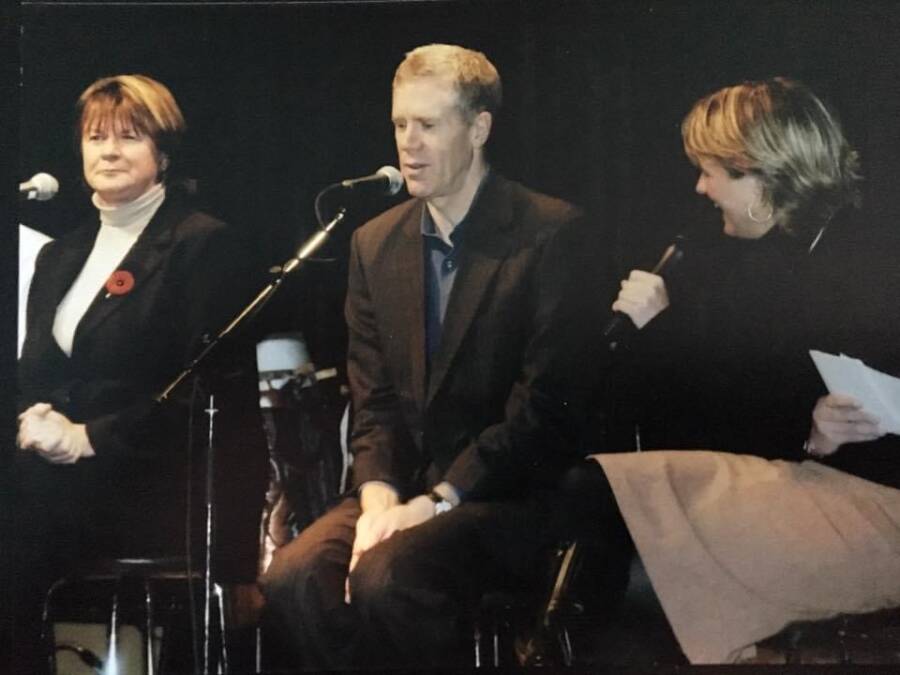
Lucy (right) interviewing Kickass Canadian Shelagh Rogers and Stuart McLean for one of her first CBC events, 2003
During Lucy’s first summer at Ottawa Morning, she took a one-month leave of absence to teach radio skills to journalists at AFRINET stations in Uganda, Tanzania and Kenya. That wound up being the first of several trips to Africa. In 2006, she and Andy travelled to the University of Rwanda, in Butare, to teach a broadcasting course, which was offered through Carleton University’s Rwanda Initiative. While there, they took a trip to Kinihira to deliver funds to the local school. “Kinihira is where [retired Lieutenant-General] Roméo Dallaire said he found some peace during the [1993] genocide,” says Lucy. After reading Dallaire’s account, students at St. Luke School in Ottawa wanted to help, and they trusted Lucy to get their donation in the right hands. “That was such a moving visit. We stood on the edge of a hill he often looked out from when he was dealing with so many demons.” In 2010, she taught radio skills at the News Agency of Nigeria. And in 2011, she travelled to Lesotho to support Peg Herbert’s efforts with her organization Help Lesotho, which was launching a school for girls. “I went for a couple weeks to teach critical thinking to young girls and to be part of that amazing program,” says Lucy.
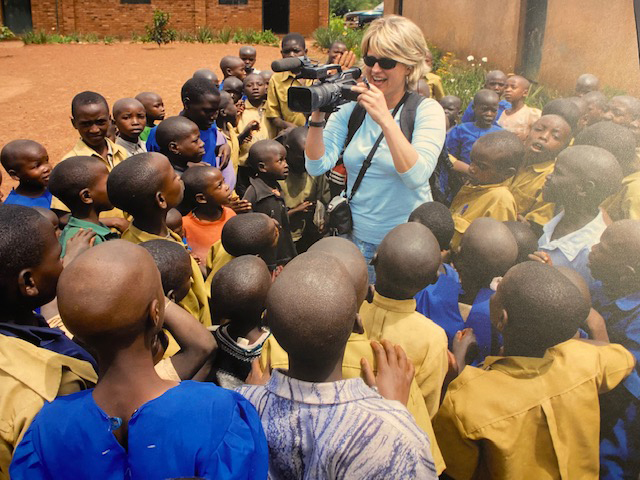
Lucy surrounded by students at the local school in Kinihira, Rwanda, 2006
In that time, she left radio for television. Why? An opening came up and she was, once again, intrigued. “I’ve always loved radio, so I had to give (the offer) some thought. But it was an incredible opportunity. They were rebuilding the show… and I just wanted to be part of developing something new for the 6pm slot. It all just came together.”
From 2006 to 2021, Lucy hosted—and, as of 2009, co-hosted alongside Adrian Harewood—CBC Ottawa News at 6pm. A gifted anchor, she especially shone when reporting on breaking news—for example, the 2014 Parliament Hill shootings, the 2019 Westboro Station bus crash. “I loved (breaking news) the most, because it’s unscripted,” she says. “It’s using your wits and your knowledge to tell a story. And it’s the most challenging part of anchoring a show, when you don’t know what’s happening but you’ve got to keep the balls in the air. My brain goes into this hyper-focus where I’m talking to the camera but I’m also thinking about the next thing we need to do, which parts of the story we need to cover… I was so grateful to be able to do that on a number of events because that is when all of your skills come together in one place. Our show won the [2020] Canadian Screen Award for coverage of the bus crash exactly because of that. Adrian is outstanding in the field, that’s where he was; I was on the desk; and we were able to tell this story to the city, using all of the skills we had spent the last 15 years developing. That’s why it’s so meaningful.”
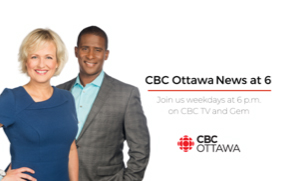
During those 15 years, Lucy did so much more beyond anchoring CBC Ottawa News. As just one example, in 2012, she and her friend Laura Cabott, who was a residential school lawyer in Yukon, made a documentary short called North Boys: The Story of Jimmy and Charlie. Charlie Pete and Jimmy Dennis were two of the approximately 150,000 Indigenous children who were taken from their homes and sent to Canadian residential schools. They asked Laura to help them tell their story, and she engaged Lucy—who had never made a film—as director, as well as co-writer and co-producer. “We said yes (to Charlie and Jimmy), and then we started to figure out how to do it,” says Lucy.
With Charlie and Jimmy’s blessing, she and Laura arranged screenings in their Northern communities. But Lucy hasn’t done a lot more to promote the documentary. “It’s not my place to be the storyteller for Indigenous people,” she says. “We wanted to help Jimmy and Charlie tell their story because they asked us, not because it’s our story or we have any claim to it—obviously not. I think at the time, it spoke to just how horrific the experience of residential schools was, and not a lot of people were talking about it then. So, I was honoured to be brought into the confidence of Jimmy and Charlie to tell their story.”
Another of Lucy’s extracurriculars around that time was to climb aboard a Students on Ice Arctic Expedition as part of the staff team in 2014. That’s how she met Arctic explorer, author and Kickass Canadian James Raffan, who nominated her for this website. “If I could be like one person I’ve encountered in my life so far, it would be my friend Lucy with the longest last name in the world,” he says. “She’s smart. She’s engaging. She’s accomplished. She’s a fully-functioning inter-disciplinarian. When life knocks her down, she pops back up stronger. Always. And yet she’s the one celebrating others, with curiosity to burn and compassion to spare.”
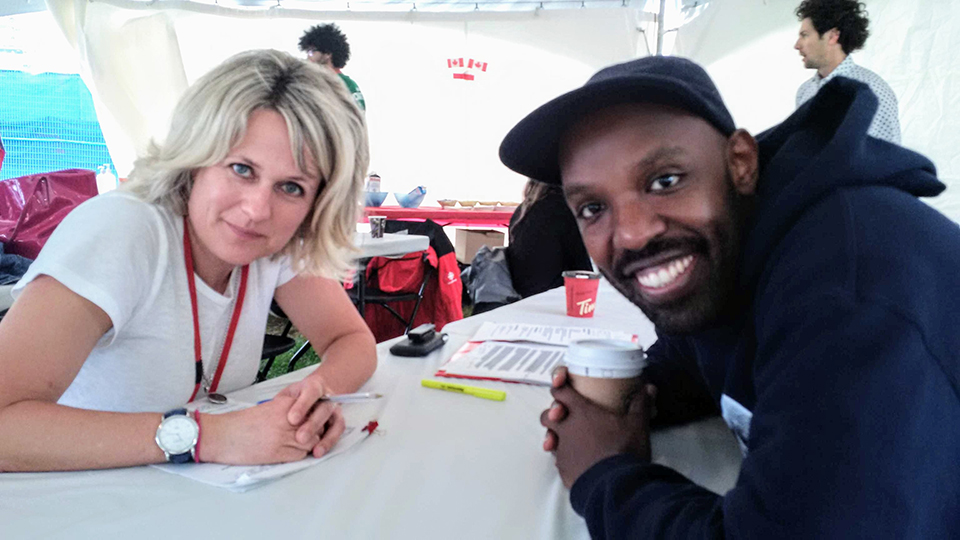
Interviewing rapper and former CBC Radio One q host Shad, July 1, 2015
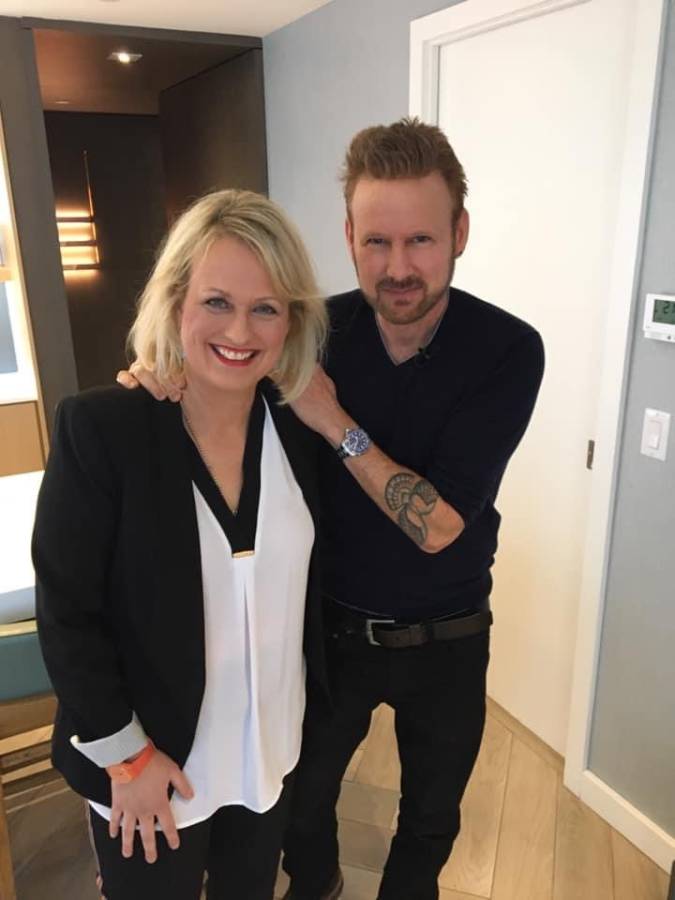
Interviewing singer-songwriter Corey Hart, 2019
Redefining moments
As a public figure, Lucy’s battle with cancer has been well documented. It’s something she shared with her viewers, with her trademark warmth and openness—not to mention optimism. In 2015, she was diagnosed with Stage 2 breast cancer; the prognosis was positive and, thankfully, accurate. After 16 months of treatment, she was cleared of cancer and returned to work at CBC Ottawa News.
But although the cancer has left her body, it’s never far from her mind. “It’s not something you ever just get over,” she says. “It’s a new way of being, a new way of living and approaching the world. You’re wrestling with fear every day, wondering if it’s lurking somewhere, if it’s coming back; you’re wrestling with how finite and how short life is.”
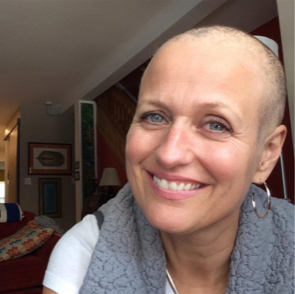
One year after Lucy’s treatment ended, her sister, Tracy, received a similar diagnosis. The family was optimistic that she’d recover, just as Lucy had. But Tracy’s cancer proved to be aggressive and terminal; she passed away in October 2018 at age 47.
Lucy wrote a beautiful tribute to her sister, in advance of the family’s first Christmas without her. Now, she shares how she thinks Tracy would most like to be remembered: “As a kind person, as someone who loved her friends and family, as someone who loved her kids. Someone who tried really hard to be a good person. She really was kind to almost everybody she met; that was something I learned from spending so much time with her in the last couple years of her life.”
Tracy was an early childhood educator and a single mother. She left behind her son, Isaiah, now 24, and daughter, Anaiya, 16. Isaiah is an aspiring musician, singer-songwriter and hip-hop producer in Toronto. Anaiya lives with Lucy and Andy, who are raising her. “It’s a major life change because I wasn’t really planning to have kids,” says Lucy, “but she is such a blessing and she’s so creative. She works hard at her dance, works hard at school. She’s an awesome kid and we’re just finding our way together: me as someone who’s never had kids, her as having to uproot her whole life from Hamilton and move to Ottawa when she was 13, after losing her mom… We’re so lucky to have each other as we go through our grief about Tracy.”
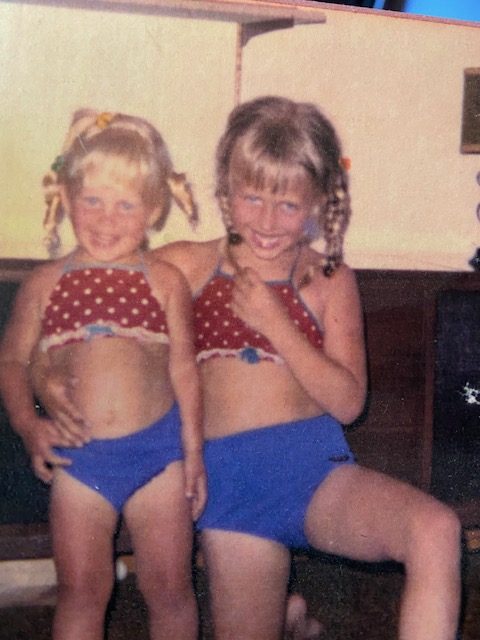
Lucy (right) and Tracy
One-woman powerhouse
True to form, this past summer, Lucy answered another call she’d been getting from her gut: she left CBC in July 2021 simply because she felt it was time to do something else. She has many treasured memories of CBC, and of the “wonderful and lovely and smart and hard-working” people she met there. And she cherishes her experiences as host of CBC Ottawa News. “It was so rewarding and it was so important to me, both to be telling those local stories to Ottawa, but also because being in that job allowed me to connect with so many people in the city. It was humbling to meet with community organizations and the people volunteering so many hours of their lives to make their world and community a better place. I loved that part.”
Since leaving that behind, Lucy has been hosting events for the Ottawa International Writers Festival, the Wakefield Writers Festival and the Ottawa Regional Cancer Foundation, among other groups. She’s also been recording voicework from her basement, for commercials and documentaries. And she’s been delivering media training and strategic communications to various clients. “It’s mixed bag of things and I love all of them for different reasons.”
Then there’s the one-woman show she wrote, called Me, Vivien Leigh and the Roller Rink. It was live-streamed in June 2021 as part of the Ottawa StoryTellers Signature Series and will debut in-person in February 2022 at Ottawa’s Undercurrents Festivals. “(It’s about) my 15-year-old self finding a dream job at the roller rink, and this unexpected connection to Vivien Leigh / Scarlett O’Hara at a time when there weren’t many female role models in my world, and how that all came together in one place.”
Her plan, as much as she ever has a plan, is to keep reaching into that Mary Poppins-style mixed bag of occupations for the next while. And to get back to travelling. As soon as COVID allows, she plans to visit Yukon, where she’ll catch up with loved ones—and hopefully ski, even before Ottawa’s trails are snow-covered, and maybe join some girlfriends on a moose hunt. Who knows? “My friends up there do fascinating things and are fascinating people, and I glom on whenever I can.”
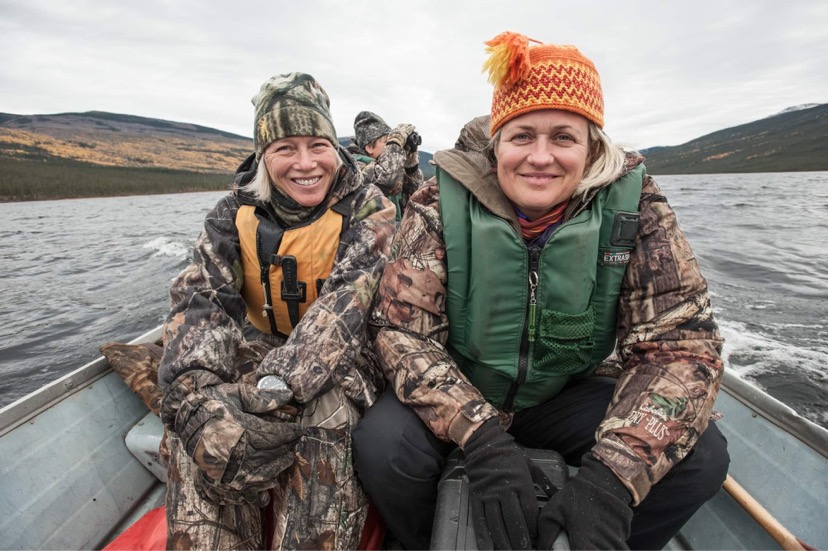
Lucy (right) and friends on a moose hunting trip in Yukon, 2014
She’s as comfortable as ever tapping into her freer side; she knows that allowing access to that part in all of us—the one that says yes more than no—plays a big role in revealing and becoming our true selves. And in snuffing out any possible future regrets.
“Through my own cancer, through my sister’s cancer and through COVID, (I’ve learned that) anything can change at any time. If there’s something that’s niggling at you, just go for it now. It may not work out but it also may work out spectacularly. I guess as you get older, you live your life in more clichés, which is: there’s no time like the present and carpe all the diems.”
A few months ago, Lucy lost another dear friend to metastatic breast cancer—Georgina Brown, someone she met while living in Yukon. “What a bright spark she was,” says Lucy. “She had socks that said Carpe Fuckin’ Diem. That was her thing. You honour the people who died young when you’re not wasting the extra time that you’ve been given. You really don’t know what’s happening tomorrow. So Carpe Fuckin’ Diem, as Georgina would say.”
The words ring just as true when Lucy says them.
* * *
For the latest on Lucy, follow @LucyvanOlden on Twitter and @vanoldenbarneveldlucy on Instagram.
 Kickass Canadians
Kickass Canadians